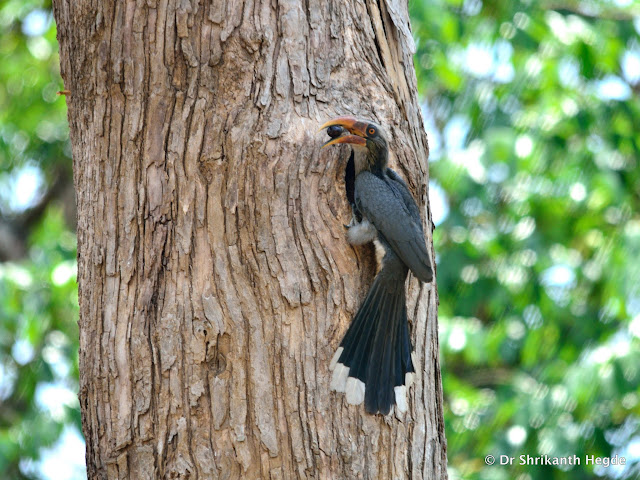Indian Grey Hornbills and Malabar Grey Hornbills are the common
type of Hornbills seen in India. There are nearly ten types of hornbills seen
in India but the Indian grey hornbill,Malabar grey horn bill, Malabar pied
hornbills, Great Hornbills are the common types seen. They are wide spread in
the western Ghats, and also eastern Indian forests. Hornbills are charecterised
by their horn like beak and pied hornbills have a casque on their upper
mandible. The beak is coloured and the bird is blackish grey .
Hornbills Have a
unique breeding pattern. They are monogamous, and select a cavity in a tall
tree for nesting.They make their nest and then seal the cavity with mud,fruit
pulp,its droppings etc and when complete has an opening for the female bird to
just squeeze inside. After the female enters the nest, the male completely seals the
nest and there is one small opening for feeding the inmate bird. Now the male
feeds the female and female lays 4-6 eggs. Once inside the nest ,the female undergoes
complete moult by shedding all its feathers and it incubates the eggs and then
the chicks. At this stage it is totally dependent on the male bird. If something
happens to the male bird and if it dies, then the entire family dies. This female bird
cannot fly and cannot feed the chicks also. When the chicks are sufficiently
grown the female breaks open the nest and comes out and both feed the young. Some opine that the female cannot break open the nest on its own and when it is time to come out the male bird breaks the nest from outside. The cycle lasts for 60 days. In this period they fight several adversities
including predator attacks, snakes, poaching humans (and Photographers of
course).
During the nesting the male bird feeds the female and the
chicks with a variety of fruits, estimated to be more than 30 different types and also small insects,lizards etc. It travels long distances in search
of food. The fruits are held in its throat and when it reaches nest it
regurgitates the fruit one by one from its pharynx to its beak and feeds the
inmates. The female do not come out except putting its beak out .
These birds use the same tree and nest for the future
breeding also and come back to same point in their next breeding cycle.
This picture shows a malabar grey hornbill feeding into
its nest.
A malabar pied Hornbill at Dandeli forest
Few other photos taken at Dandeli can also viewed here by
clicking this link or the photo below.
 |
| Dandeli |






Lovely photos and nice explanation sir.
ReplyDeleteThank you sir for your encouraging words
DeleteApart from the usual beauty of your photos I found the narration more interesting.What an adventure these birds undertake and how risky is the whole process.....is simply astonishing.The bond between male and female is also exemplary.The female trusts the male blindly and the male does not commit breach of trust!A lesson to the mankind!
DeleteThanks for the information and congrats on the photo art.
A S N Hebbar
Super Photography Srikanth Hegde G
ReplyDeleteHats up
janardhsn Kodavoor
94482 52363
Thank you sir for your appreciation and kind words
DeleteHello Dr. Hegde, I pride myself on bird photos, but they don't hold a candle to yours! I just returned from the Pantanal in Brazil and have been to India 3 times. I would love to visit the Shimoga area. Would you accept a phone call (or call me at 1-925-718-5551 [California time])?
ReplyDeleteRichard D. Hyman, MD
221 Hemme Avenue
Alamo CA 94507-2146
(925) 718-5551
eyes4yu@gmail.com